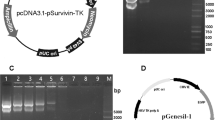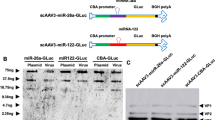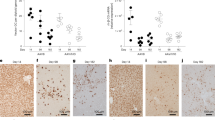Abstract
Suicide gene therapy combining herpes simplex virus thymidine kinase gene transfer and ganciclovir administration can be envisioned as a powerful therapeutical approach in the treatment of hepatocellular carcinoma; however, safety issues regarding transgene expression in parenchyma cells have to be addressed. In this study, we constructed LATKW, a lentiviral vector expressing the HSV-TkEGFP gene placed under the control of the promoter elements that control the expression of the rat alpha-fetoprotein, and assayed its specific expression in vitro in hepatocarcinoma and nonhepatocarcinoma human cell lines, and in epidermal growth factor stimulated human primary hepatocytes. Using LATKW, a strong expression of the transgene was found in transduced hepatocarcinoma cells compared to a very low expression in nonhepatocarcinoma human cell lines, as assessed by Northern blot, RT-PCR, FACS analysis and ganciclovir-mediated toxicity assay, and no expression was found in lentivirally transduced normal human hepatocytes. Altogether, these results demonstrate the possibility to use a lentivirally transduced expression unit containing the rat alpha-fetoprotein promoter to restrict the HSV-TK-mediated induced GCV sensitivity to human hepatocarcinoma cells.
This is a preview of subscription content, access via your institution
Access options
Subscribe to this journal
Receive 12 print issues and online access
$259.00 per year
only $21.58 per issue
Buy this article
- Purchase on Springer Link
- Instant access to full article PDF
Prices may be subject to local taxes which are calculated during checkout





Similar content being viewed by others
References
Okuda K . Hepatocellular carcinoma. J Hepatol. 2000;32:225–237.
Colombo M . Natural history and pathogenesis of hepatitis C virus related hepatocellular carcinoma. J Hepatol. 1999;31:25–30.
Brechot C, Jaffredo F, Lagorce D, et al. Impact of HBV, HCV and GBV-C/HGV on hepatocellular carcinomas in Europe: results of a European concerted action. J Hepatol. 1998;29:173–183.
El-Serag HB, Mason AC . Rising incidence of hepatocellular carcinoma in the United States. N Engl J Med. 1999;340:745–750.
Deuffic S, Buffat L, Poynard T, et al. Modeling the hepatitis C virus epidemic in France. Hepatology. 1999;29:1596–1601.
Ringe B, Pichlmayr R, Wittekind C, et al. Surgical treatment of hepatocellular carcinoma: experience with liver resection and transplantation in 198 patients. World J Surg. 1991;15:270–285.
Mazzaferro V, Regalia E, Doci R, et al. Liver transplantation for the treatment of small hepatocellular carcinomas in patients with cirrhosis. N Engl J Med. 1996;334:693–699.
Bismuth H, Chiche L, Adam R, et al. Liver resection versus transplantation for hepatocellular carcinoma in cirrhotic patients. Ann Surg. 1993;218:145–151.
Schlitt HJ, Neipp M, Weimann A, et al. Recurrence patterns of hepatocellular and fibrolamellar carcinoma after liver transplantation. J Clin Oncol. 1999;17:324–331.
Qian C, Drozdzik M, Caselmann WH, et al. The potential of gene therapy in the treatment of hepatocellular carcinoma. J Hepatol. 2000;32:344–351.
Gerolami R, Cardoso J, Lewin M, et al. Evaluation of HSV-tk gene therapy in a rat model of chemically induced hepatocellular carcinoma by intratumoral and intrahepatic artery routes. Cancer Res. 2000;60:993–1001.
Brand K, Arnold W, Bartels T, et al. Liver-associated toxicity of the HSV-tk/GCV approach and adenoviral vectors. Cancer Gene Ther. 1997;4:9–16.
Bilbao R, Gerolami R, Bralet MP, et al. Transduction efficacy, antitumoral effect, and toxicity of adenovirus-mediated herpes simplex virus thymidine kinase/ganciclovir therapy of hepatocellular carcinoma: the woodchuck animal model. Cancer Gene Therapy. 2000;7:657–662.
Brand K, Loser P, Arnold W, et al. Tumor cell-specific transgene expression prevents liver toxicity of the adeno-HSVtk/GCV approach. Gene Therapy. 1998;5:1363–1371.
Gerolami R, Uch R, Jordier F, et al. Gene transfer to hepatocellular carcinoma: transduction efficacy and transgene expression kinetics by using retroviral and lentiviral vectors. Cancer Gene Ther. 2000;7:1286–1292.
Park F, Ohashi K, Chiu W, et al. Efficient lentiviral transduction of liver requires cell cycling in vivo. Nat Genet. 2000;24:49–52.
Fujiyama S, Tanaka M, Maeda S, et al. Tumor markers in early diagnosis, follow-up and management of patients with hepatocellular carcinoma. Oncology. 2002;62 (Suppl 1):57–63.
Kiwaki K, Kanegae Y, Saito I, et al. Correction of ornithine transcarbamylase deficiency in adult spf(ash) mice and in OTC-deficient human hepatocytes with recombinant adenoviruses bearing the CAG promoter. Hum Gene Ther. 1996;7:821–830.
Zufferey R, Donello JE, Trono D, et al. Woodchuck hepatitis virus posttranscriptional regulatory element enhances expression of transgenes delivered by retroviral vectors. J Virol. 1999;73:2886–2892.
Naldini L, Blomer U, Gallay P, et al. In vivo gene delivery and stable transduction of nondividing cells by a lentiviral vector. Science. 1996;272:263–267.
Kaneko S, Hallenbeck P, Kotani T, et al. Adenovirus-mediated gene therapy of hepatocellular carcinoma using cancer-specific gene expression. Cancer Res. 1995;55:5283–5287.
Arbuthnot P, Bralet M, LeJossic C, et al. In vitro and in vivo hepatoma cell specific expression of a gene transferred with an adenoviral vector. Hum Gene Ther. 1996;7:1503–1514.
Arbuthnot P, Bralet M-P, Thomassin H, et al. Hepatoma cell-specific expression of a retrovirally transferred gene is achieved by alpha-foetoprotein but not insulin-like growth factor II regulatory sequences. Hepatology. 1995;22:1788–1796.
Kanai F, Lan KH, Shiratori Y, et al. In vivo gene therapy for alpha-fetoprotein-producing hepatocellular carcinoma by adenovirus-mediated transfer of cytosine deaminase gene. Cancer Res. 1997;57:461–465.
Kanai F, Shiratori Y, Yoshida Y, et al. Gene therapy for alpha-fetoprotein-producing human hepatoma cells by adenovirus-mediated transfer of the herpes simplex virus thymidine kinase gene. Hepatology. 1996;23:1359–1368.
Gouillat C, Manganas D, Zoulim F, et al. Woodchuck hepatitis virus-induced carcinoma as a relevant natural model for therapy of human hepatoma. J Hepatol. 1997;26:1324–1330.
Aghi M, Hochberg F, Breakefield XO . Prodrug activation enzymes in cancer gene therapy. J Gene Med. 2000;2:148–164.
Author information
Authors and Affiliations
Corresponding author
Rights and permissions
About this article
Cite this article
Uch, R., Gérolami, R., Faivre, J. et al. Hepatoma cell-specific ganciclovir-mediated toxicity of a lentivirally transduced HSV-TkEGFP fusion protein gene placed under the control of rat alpha-fetoprotein gene regulatory sequences. Cancer Gene Ther 10, 689–695 (2003). https://doi.org/10.1038/sj.cgt.7700621
Received:
Published:
Issue Date:
DOI: https://doi.org/10.1038/sj.cgt.7700621
Keywords
This article is cited by
-
Effects on the STAT3-shRNA in Non-Small-Cell Lung Cancer Therapy: Design, Induction of Apoptosis, and Conjugation with Chitosan-Based Gene Vectors
Journal of Ocean University of China (2021)
-
Inhibition of E-selectin expression on the surface of endothelial cells inhibits hepatocellular carcinoma growth by preventing tumor angiogenesis
Cancer Chemotherapy and Pharmacology (2016)
-
Lentiviral Vectors in Gene Therapy: Their Current Status and Future Potential
Archivum Immunologiae et Therapiae Experimentalis (2010)
-
Lentiviral vectors for cancer immunotherapy: transforming infectious particles into therapeutics
Gene Therapy (2007)



